Stefan Mellem
CI-Bench: Benchmarking Contextual Integrity of AI Assistants on Synthetic Data
Sep 20, 2024



Abstract:Advances in generative AI point towards a new era of personalized applications that perform diverse tasks on behalf of users. While general AI assistants have yet to fully emerge, their potential to share personal data raises significant privacy challenges. This paper introduces CI-Bench, a comprehensive synthetic benchmark for evaluating the ability of AI assistants to protect personal information during model inference. Leveraging the Contextual Integrity framework, our benchmark enables systematic assessment of information flow across important context dimensions, including roles, information types, and transmission principles. We present a novel, scalable, multi-step synthetic data pipeline for generating natural communications, including dialogues and emails. Unlike previous work with smaller, narrowly focused evaluations, we present a novel, scalable, multi-step data pipeline that synthetically generates natural communications, including dialogues and emails, which we use to generate 44 thousand test samples across eight domains. Additionally, we formulate and evaluate a naive AI assistant to demonstrate the need for further study and careful training towards personal assistant tasks. We envision CI-Bench as a valuable tool for guiding future language model development, deployment, system design, and dataset construction, ultimately contributing to the development of AI assistants that align with users' privacy expectations.
Smartphone-based Hard-braking Event Detection at Scale for Road Safety Services
Feb 04, 2022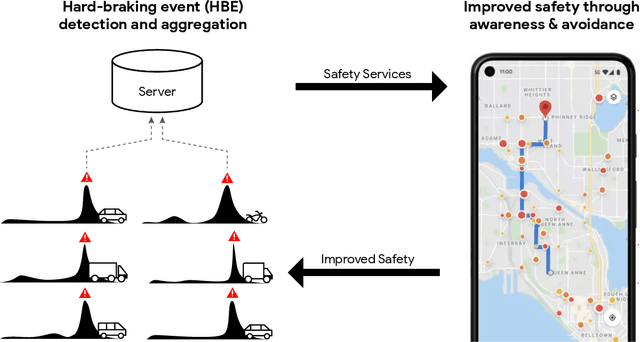

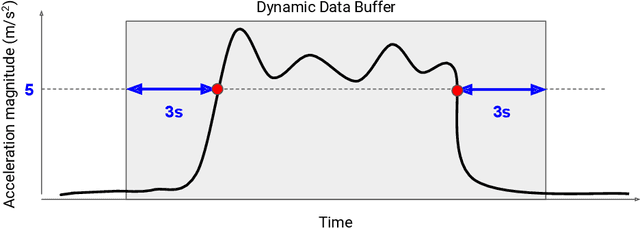

Abstract:Road crashes are the sixth leading cause of lost disability-adjusted life-years (DALYs) worldwide. One major challenge in traffic safety research is the sparsity of crashes, which makes it difficult to achieve a fine-grain understanding of crash causations and predict future crash risk in a timely manner. Hard-braking events have been widely used as a safety surrogate due to their relatively high prevalence and ease of detection with embedded vehicle sensors. As an alternative to using sensors fixed in vehicles, this paper presents a scalable approach for detecting hard-braking events using the kinematics data collected from smartphone sensors. We train a Transformer-based machine learning model for hard-braking event detection using concurrent sensor readings from smartphones and vehicle sensors from drivers who connect their phone to the vehicle while navigating in Google Maps. The detection model shows superior performance with a $0.83$ Area under the Precision-Recall Curve (PR-AUC), which is $3.8\times$better than a GPS speed-based heuristic model, and $166.6\times$better than an accelerometer-based heuristic model. The detected hard-braking events are strongly correlated with crashes from publicly available datasets, supporting their use as a safety surrogate. In addition, we conduct model fairness and selection bias evaluation to ensure that the safety benefits are equally shared. The developed methodology can benefit many safety applications such as identifying safety hot spots at road network level, evaluating the safety of new user interfaces, as well as using routing to improve traffic safety.
Towards Sparse Federated Analytics: Location Heatmaps under Distributed Differential Privacy with Secure Aggregation
Nov 03, 2021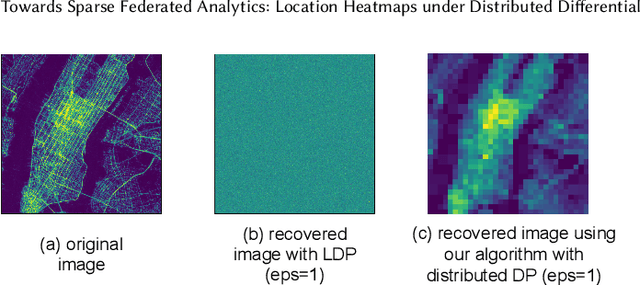
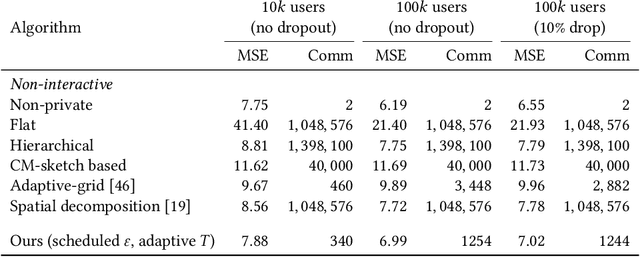
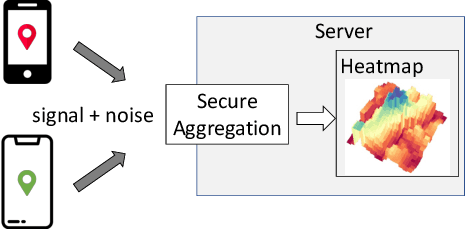

Abstract:We design a scalable algorithm to privately generate location heatmaps over decentralized data from millions of user devices. It aims to ensure differential privacy before data becomes visible to a service provider while maintaining high data accuracy and minimizing resource consumption on users' devices. To achieve this, we revisit the distributed differential privacy concept based on recent results in the secure multiparty computation field and design a scalable and adaptive distributed differential privacy approach for location analytics. Evaluation on public location datasets shows that this approach successfully generates metropolitan-scale heatmaps from millions of user samples with a worst-case client communication overhead that is significantly smaller than existing state-of-the-art private protocols of similar accuracy.
 Add to Chrome
Add to Chrome Add to Firefox
Add to Firefox Add to Edge
Add to Edge